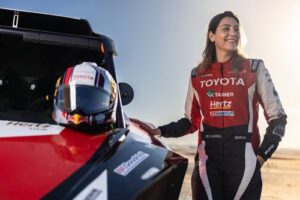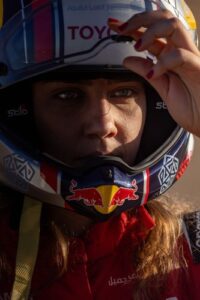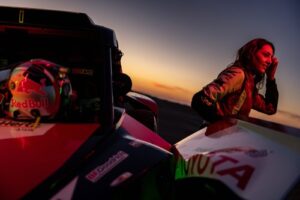With the upcoming Dakar Rally set to ignite the landscapes of Saudi Arabia on January 5, anticipation is soaring among drivers and riders preparing for this grand spectacle. Among them is Saudi rally champion Dania Akeel, a trailblazer in the multifaceted world of motorsports.
- Diverse Racing Journey: From the UAE National Sports Bike Superseries to the Dakar Rally, Dania began as a leisure motorcyclist in the UAE. The transition to rally racing felt natural, rooted in her off-road desert experiences.
- Dakar Rally Challenges: Dania reflects on her first Dakar race, emphasising the joy amid toughness. Overcoming challenges, like navigating water and heat, is about developing skills and maintaining a positive mentality.
- Benefits of the Dakar: Dania highlights the physical and healthy camaraderie among drivers and riders. The Dakar Rally fosters discipline, commitment, and personal growth, not just as competitors but as a team.
- Lessons Learnt: Recalling her 2022 Dakar experience, Dania stresses the importance of staying focused on the present moment. An initial setback with her car’s turbo became a valuable lesson in resilience and concentration.
- Inspiring Women in Motorsports: Dania underscores the inclusivity of motorsports, rejecting the burden of individual athletes representing entire categories. She encourages aspiring female drivers to pursue their passion without hesitation.
- Dakar’s Cultural Impact: Being a Saudi, Dania cherishes the Dakar Rally’s role in showcasing diverse regions of her country. It’s a cultural exploration, breaking stereotypes, and fostering connections with people from around the world.

Your racing journey, from the UAE National Sports Bike Superseries to the Dakar Rally, has been diverse. What drew you to rally racing and inspired you to take on the Dakar?
I started racing motorcycles in circuits in the United Arab Emirates as a leisure activity. I used to go to the track on weekends, and it was just a lot of fun. I switched to rally because I saw that Saudi Arabia hosted international events, such as the Dakar Rally – which is hugely popular there.
It looked like a very exciting sport, and since I grew up riding quad bikes in the desert off-road, rallying felt familiar. Starting from bikes on the track sets you up for speed. You become accustomed to it, and get comfortable in a car, making it a nice entry point to racing.
At the time, it was 2021, and the borders were closed due to the coronavirus pandemic. That’s when I seriously started considering rallying as travel was limited. I thought, ‘Okay, what can I do in racing at this moment?’ I looked at Saudi Arabia, and this was what was going on. It was a change, but everything felt very natural and like a very organic transition. Since then, it’s just been so much fun.
The Dakar Rally is known for its extreme conditions. Can you share some of the biggest challenges you have faced?
In my first Dakar race, many people kept telling me how tough [of a competition] it was. But when I got in the car and started driving, I wondered why they weren’t emphasising how fun it actually was. After all, we love driving and spending the whole day in the car. Yes, it is a challenging race, but in the end, the basic reason you are there is your love for the sport. Whatever difficulties or obstacles you think you’ll have to face, they become lessons on how to become a better driver or how to develop your character.
For example, during my first year of rally, 400 kilometres felt like a lot, and I remember counting the kilometres. But today, 400 kilometres are more or less standard, and I no longer have to coach myself through the distances as often because they’ve become familiar
When it comes to terrain or weather conditions, it can be tricky to go through the water in rally cars; and if it’s hot, you’re behind a windscreen and you don’t get much air, how do you maintain your focus when you feel uncomfortable physically? You have a choice on how to face those challenges, and you can try your best to learn how to pass through them – whether you need to be a more patient driver through the water, or need to be a bit more responsible in how you hydrate when it’s hot, or a bit more careful with how you approach the dunes. This just forces you to develop your skills, and with that mentality, it’s easier to have a good time. If you keep thinking ‘This is a difficult race,’ then it is easy for the fun to leave the picture.
What are some positive aspects or benefits of participating in the Dakar, besides the love for driving?

Drivers and riders are all coming together for a really healthy and physical purpose. They wake up early in the morning, concentrate, and perform. Setting targets and goals, they execute them with discipline and commitment. They have responsibilities towards their sponsor and teammates, and, in the face of daily challenges, they must find the maturity to overcome them. They also must communicate effectively to build a good team. It’s a really rich environment for personal growth.
Reflecting on your first Dakar Rally in 2022, what were the standout moments or lessons that you carry with you into the upcoming races?
In the first week, I was having a great time driving without focusing on results. My goal was just to finish [the race]. By the end of week one, I discovered we made it to P6 in the T3 [lightweight vehicles category], which is good for a rookie – P6 out of 40 cars at the time, that’s promising. However, during the rest day, people told me I had a chance at the podium and I started thinking about the results. This changed my mentality
On day seven I noticed the car had a turbo issue. Focused on results and stressed by the turbo lag, I [made the mistake of using] the brakes less to maintain the momentum and compensate for speed. I crashed the car, and we lost 4 hours fixing it as well as nine positions. We came back in 15th place from P6. And it was all because I took my focus away from the driving, started to get frustrated, and made a mistake.

With five days left in the race, I had a choice to make: either I could just give up and finish the race – and that would have probably been a miserable experience – or I could buckle up and focus. I thought ‘No, I have five days. Let me drive as best as I can, and enjoy every kilometre as it is a privilege to be in this race.’ Within five days we climbed back to the top ten and finished in P8.
If you’re driving a car and you’re thinking about the outcome instead of what you’re doing in that moment, it’s very likely you could encounter a problem – which is exactly what happened to me. That lesson will stay with me always.
In the traditionally male-dominated world of motorsports, your presence as a female driver is noteworthy. How do you view your role in inspiring women, not only in Saudi Arabia but globally? And what message do you have for aspiring female racers?
The point about being a woman is interesting. I never thought about it when I started racing. The International Automobile Federation (FIA) regulations state that men and women compete in the same category. What they ask you [when you want to participate] is a driver’s licence, a racing licence, safety equipment, a helmet, gloves, and shoes. I just focused on what the rules said, and that’s it. Anything that had to do with gender didn’t really cross my mind.

As one of the few women in rally, last year, I felt a sense of responsibility to represent women in the sport. On top of that, there was added pressure to perform well because I wanted people to think positively about women. Later, I realised that this was a mistake and was actually hindering my performance. It’s not realistic; one person cannot represent all. You are an athlete who is a woman, and you can only perform to the best of your ability.
Of course, there aren’t as many women in motorsports compared to men, but I don’t see this as an issue. The category is open to both men and women. If women don’t see themselves in that category, one has to ask whether it’s because they’re not interested in motorsports or if there’s a perception that this sport is not for women.
My advice to aspiring female drivers is simple: if it’s a passion and they’re attracted to rally, then they should stick to the rulebook – which invites them in – and go for it.
The Dakar Rally in Saudi Arabia is not just a race; it’s a cultural event. How do you think the Dakar impacts Saudi heritage and international perception, and how does that affect your approach to the race?

Being a Saudi, I’m truly grateful for the Dakar Rally taking place in Saudi Arabia, because it has allowed me to discover many parts of my country that I had never visited before. I have been a tourist in my own home through this event, being able to see the difference in culture between the East, West, North, and South – each region boasting different food, music, art, linguistic accents and ways of communicating with people. And that’s just all within one country. So, if someone from Saudi is gaining a deeper insight into their own country, I can only imagine how much a foreigner must be absorbing.
It’s a privilege to have access to all of these different places and to have a reason to visit them. When I drive through these towns with rally cars, locals are surprised to learn I am Saudi. This is something new for us, especially since women have been on the road only since 2018 – let alone finding a woman in a rally car. I love telling them I’m from Saudi Arabia, from Jeddah, and usually people are very friendly and hospitable. It’s quite an experience both for those people and me

And that’s in addition to the fact that you are crossing beautiful landscapes – from the beaches to the red rock canyons, the sandy dunes and the green mountains, to miles-long white rock flat lands that make you feel like you’re on the moon. In a world filled with technology, it’s always nice to be in nature, to be fully present outdoors, and to engage in something physical. It’s something invaluable, and the Dakar provides all of these things to us.
Another aspect I love about this race is how it brings people from all over the world together. I believe it’s really important to stay connected with different cultures and get to know individuals from various countries. This widens your perspective on life and enriches your overall experience. The Dakar is one big moving international gathering where you meet people exchange knowledge, and learn from one another – it’s truly a wonderful event. So it’s really not just a race. It’s a full experience
